Coronavirus: how free online consultations are easing strain on China’s hospitals and reassuring anxious patients
- Chinese health-care providers JD Health and China Resources Medical are among the first to offer free online consultations with doctors
- JD Health’s platform serves tens of thousands of patients an hour and, according to one doctor, paradoxically allows for more personal consultations

Every day from his office in Beijing, Dr Liu Yafeng provides online consultations for up to 200 patients from across China.
Since the start of the coronavirus outbreak last month, the specialist in respiratory medicine has been counselling patients worried that they have been infected with the virus.
Liu says one-fifth of the cases he handles are from Hubei province – where the virus originated – and that most of the cases are driven by unwarranted fear.
“Those with real problems – with symptoms worthy of a follow-up check – are rare. [For most], I will go through with them all the coronavirus symptoms listed in the five pages of government-issued guidelines. Then I will tell them that they are definitely not infected. I also advise them to take deep breaths, distract themselves by reading a book, and so on,” Liu says.
He instructs those with real symptoms to see a doctor in person, and to have a computerised tomography (CT) scan for a clinical diagnosis.
“This helps prevent masses of people flocking to hospitals, which stops those with a real need from getting prompt treatment and increases the cross-infection rate at hospitals,” Liu explains.